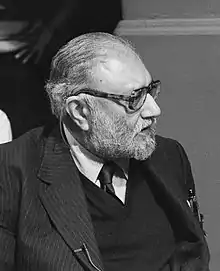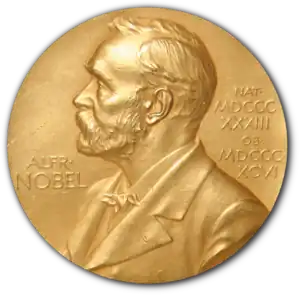List of Pakistani Nobel laureates
Following is a list of Nobel laureates who are either Pakistani or were born in the region that is now Pakistan but are not Pakistani by nationality.
Laureates
Pakistani citizens
As of 2022, the list of Pakistani Nobel laureates consists of following people.[1]
| Year | Portrait | Laureate | Subject | Rationale |
|---|---|---|---|---|
| 1979 |  |
Abdus Salam | Physics | Awarded jointly to Sheldon Glashow, Abdus Salam and Steven Weinberg – "for their contributions to the theory of the unified weak and electromagnetic interaction between elementary particles, including, inter alia, the prediction of the weak neutral current"[2][3] |
| 2014 |  |
Malala Yousafzai | Peace | Awarded jointly to Kailash Satyarthi and Malala Yousafzai – "for their struggle against the suppression of children and young people and for the right of all children to education."[4] |
Nobel laureates born in region that later become Pakistan
The laureates below were born in the part of the British Raj that became Pakistan, but immigrated before independence and are not Pakistani by nationality.
| Year | Laureate | Country | Subject | Rationale | |
|---|---|---|---|---|---|
| 1968 |  |
Har Gobind Khorana (born in Raipur, British Punjab) |
Physiology or Medicine | Awarded along with Robert W. Holley and Marshall W. Nirenberg – "for their interpretation of the genetic code and its function in protein synthesis."[5] | |
| 1983 |  |
Subrahmanyan Chandrasekhar (born in Lahore, British Punjab) |
Physics | "For his theoretical studies of the physical processes of importance to the structure and evolution of the stars."[6] | |
References
- "By winning the Nobel prize, Malala joins Pakistan's loneliest club". Washington Post. Archived from the original on 2015-11-18. Retrieved 2015-10-17.
- "The Nobel Prize in Physics 1979". Nobel Foundation. Archived from the original on 2018-12-26. Retrieved 2008-10-09.
- Arun Agarwal (2008). Nobel Prize Winners in Physics. APH Publishing. pp. 234–. ISBN 978-81-7648-743-6. Archived from the original on 2023-10-13. Retrieved 2018-01-30.
Pakistani physicist Abdus Salam won the 1979 Nobel Prize in physics. He won the award for his work in developing a unification hypothesis concerning electromagnetic and weak interactions between atomic particles.
- "The Nobel Peace Prize 2014". Archived from the original on 10 June 2017. Retrieved 4 May 2015.
- "H. Gobind Khorana". Archived from the original on 1 June 2017. Retrieved 4 May 2015.
- "Subramanyan Chandrasekhar". Archived from the original on 17 June 2017. Retrieved 4 May 2015.
This article is issued from Wikipedia. The text is licensed under Creative Commons - Attribution - Sharealike. Additional terms may apply for the media files.
